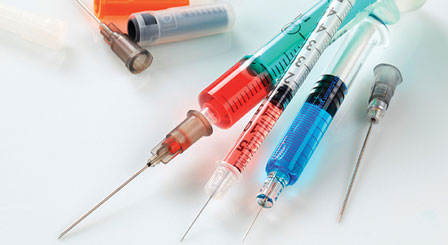Vaccination

Vaccination is the administration of antigenic material (a vaccine) to stimulate an individual's immune system to develop adaptive immunity to a pathogen. Vaccines can prevent or ameliorate morbidity from infection. When a sufficiently large percentage of a population has been vaccinated, this results in herd immunity. The effectiveness of vaccination has been widely studied and verified; for example, the influenza vaccine, the HPV vaccine, and the chicken pox vaccine.
Vaccination is the most effective method of preventing infectious diseases; widespread immunity due to vaccination is largely responsible for the worldwide eradication of smallpox and the restriction of diseases such as polio, measles, and tetanus from much of the world.
Mechanism of function
Generically, the process of artificial induction of immunity, in an effort to protect against infectious disease, works by 'priming' the immune system with an 'immunogen'. Stimulating immune responses with an infectious agent is known as immunization. Vaccination includes various ways of administering immunogens.
Some vaccines are administered after the patient already has contracted a disease. Vaccines given after exposure to smallpox, within the first three days, are reported to attenuate the disease considerably, and vaccination up to a week after exposure probably offers some protection from disease or may modify the severity of disease. The first rabies immunization was given by Louis Pasteur to a child after he was bitten by a rabid dog.

Adjuvants and preservatives
Vaccines typically contain one or more adjuvants, used to boost the immune response. Tetanus toxoid, for instance, is usually adsorbed onto alum. This presents the antigen in such a way as to produce a greater action than the simple aqueous tetanus toxoid. People who get an excessive reaction to adsorbed tetanus toxoid may be given the simple vaccine when time for a booster occurs.
Vaccination versus inoculation
Many times these words are used interchangeably, as if they were synonyms. In fact, they are different things. As doctor Byron Plant explains: "Vaccination is the more commonly used term, which actually consists of a 'safe' injection of a sample taken from a cow suffering from cowpox... Inoculation, a practice probably as old as the disease itself, is the injection of the variola virus taken from a pustule or scab of a smallpox sufferer into the superficial layers of the skin, commonly on the upper arm of the subject.

